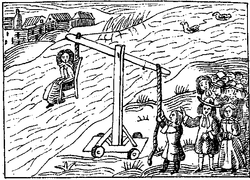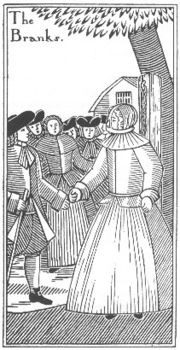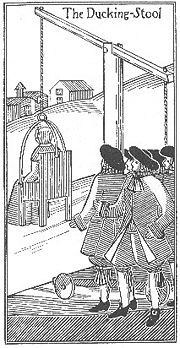
Common scold
Encyclopedia

Common law
Common law is law developed by judges through decisions of courts and similar tribunals rather than through legislative statutes or executive branch action...
of crime
Criminal law
Criminal law, is the body of law that relates to crime. It might be defined as the body of rules that defines conduct that is not allowed because it is held to threaten, harm or endanger the safety and welfare of people, and that sets out the punishment to be imposed on people who do not obey...
in England and Wales
England and Wales
England and Wales is a jurisdiction within the United Kingdom. It consists of England and Wales, two of the four countries of the United Kingdom...
, a common scold was a species of public nuisance—a troublesome and angry woman who broke the public peace by habitually arguing and quarreling with her neighbours. The Latin name for the offender, communis rixatrix, appears in the feminine gender and makes it clear that only women could commit this crime.
The offence, which was exported to North America with the colonists, was punishable by ducking
Cucking stool
Ducking-stools and cucking-stools are chairs formerly used for punishment of women in England and Scotland . The term cucking-stool derives from wyuen pine as referred in Langland's Piers Plowman.They were both instruments of social humiliation and censure, primarily for the offense of scolding...
: being placed in a chair and submerged in a river or pond. Although rarely prosecuted it remained on the statute books in England and Wales until 1967.
The offence and its punishment
In the Commentaries on the Laws of EnglandCommentaries on the Laws of England
The Commentaries on the Laws of England are an influential 18th-century treatise on the common law of England by Sir William Blackstone, originally published by the Clarendon Press at Oxford, 1765–1769...
, Blackstone
William Blackstone
Sir William Blackstone KC SL was an English jurist, judge and Tory politician of the eighteenth century. He is most noted for writing the Commentaries on the Laws of England. Born into a middle class family in London, Blackstone was educated at Charterhouse School before matriculating at Pembroke...
says of this offence:

Cucking stool
Ducking-stools and cucking-stools are chairs formerly used for punishment of women in England and Scotland . The term cucking-stool derives from wyuen pine as referred in Langland's Piers Plowman.They were both instruments of social humiliation and censure, primarily for the offense of scolding...
". The cucking stool, according to Blackstone, eventually became known as a ducking stool by folk etymology.
Other writers disagree with Blackstone's assertion equating the two sorts of punishment seat. The Domesday Book
Domesday Book
Domesday Book , now held at The National Archives, Kew, Richmond upon Thames in South West London, is the record of the great survey of much of England and parts of Wales completed in 1086...
notes the use of a cucking stool at Chester
Chester
Chester is a city in Cheshire, England. Lying on the River Dee, close to the border with Wales, it is home to 77,040 inhabitants, and is the largest and most populous settlement of the wider unitary authority area of Cheshire West and Chester, which had a population of 328,100 according to the...
, a seat also known as cathedra stercoris, a "dung chair", whose punishment apparently involved exposing the sitter's buttocks to onlookers. This seat served to punish not only scolds, but also brewers and bakers who sold bad ale or bread, whereas the ducking stool dunked its victim into the water. Francois Maximilian Misson, a French traveller and writer, recorded the method used in England in the early 18th century:
The ducking stool, rather than being fixed in position by the river or pond, could be mounted on wheels to allow the convicted woman to be paraded through the streets before punishment was carried out. Another method of ducking was to use the tumbrel, which consisted of a chair on two wheels with two long shafts fixed to the axles. This would be pushed into the ducking pond and the shafts would be released, tipping the chair up backwards and ducking the occupant.
A scold's bridle
Scold's bridle
A scold's bridle, sometimes called "the branks", was a punishment device for men and women, also used as a mild form of torture. It was an iron muzzle in an iron framework that enclose the head. The bridle-bit was about 2 inches long and 1 inch broad, projected into the mouth and pressed down on...
, known in Scotland as a brank, consists of a locking metal mask or head cage that contains a tab that fits in the mouth to inhibit talking. Some have claimed that convicted common scolds had to wear such a device as a preventive or punitive measure. Legal sources do not mention them in the context of the punishment of common scolds, but there are anecdotal reports of their historical use as a public punishment. In the United States, scolds or those convicted of similar offences could be sentenced to stand with their tongue in cleft stick, a more primitive but easier to construct version of the scold's bridle, but the ducking stool also made the trip across the Atlantic.
Historical prosecutions

Norwich
Norwich is a city in England. It is the regional administrative centre and county town of Norfolk. During the 11th century, Norwich was the largest city in England after London, and one of the most important places in the kingdom...
, England claims to mark the site of a "cucking" stool, and that from 1562–1597 "strumpets" and common scolds suffered the punishment of dunking there. In the Percy Anecdotes, published pseudonymously in 1820, the authors state that "How long the ducking-stool has been in disuse in England does not appear." The Anecdotes also suggest penological
Penology
Penology is a section of criminology that deals with the philosophy and practice of various societies in their attempts to repress criminal activities, and satisfy public opinion via an appropriate treatment regime for persons convicted of criminal offenses.The Oxford English Dictionary defines...
ineffectiveness as grounds for the stool's disuse; the text relates the 1681 case of a Mrs. Finch, who according to this account had received three convictions and duckings as a common scold. On her fourth conviction, the King's Bench
King's Bench
The Queen's Bench is the superior court in a number of jurisdictions within some of the Commonwealth realms...
declined to dunk her again, and instead ordered her to pay a fine of three marks
Mark (money)
Mark was a measure of weight mainly for gold and silver, commonly used throughout western Europe and often equivalent to 8 ounces. Considerable variations, however, occurred throughout the Middle Ages Mark (from a merging of three Teutonic/Germanic languages words, Latinized in 9th century...
, and ordered her imprisoned until payment took place.
The Percy miscellany also quotes a pastoral poem by John Gay
John Gay
John Gay was an English poet and dramatist and member of the Scriblerus Club. He is best remembered for The Beggar's Opera , set to music by Johann Christoph Pepusch...
(1685–1732), who wrote that:
- I'll speed me to the pond, where the high stool
- On the long plank, hangs o'er the muddy pool,
- That stool the dread of ev'ry scolding quean.
and also a 1780 poem by Benjamin West
Benjamin West
Benjamin West, RA was an Anglo-American painter of historical scenes around and after the time of the American War of Independence...
, who wrote that:
- There stands, my friend, in yonder pool,
- An engine call'd a ducking-stool;
- By legal pow'r commanded down,
- The joy and terror of the town.
- If jarring females kindle strife. . .
While these literary sources do not prove that the punishment still took place they do provide evidence that it had not been forgotten.
In The Queen v. Foxby, 6 Mod. 11 (1704), counsel for the accused stated that he knew of no law for the dunking of scolds. Lord Chief Justice John Holt
John Holt (judge)
Sir John Holt was an English lawyer and served as Lord Chief Justice of England from 17 April 1689 to his death.-Biography:...
of the Queen's Bench apparently pronounced this error, for he announced that it was "better ducking in a Trinity
Trinity Sunday
Trinity Sunday is the first Sunday after Pentecost in the Western Christian liturgical calendar, and the Sunday of Pentecost in Eastern Christianity...
, than a Michaelmas
Michaelmas
Michaelmas, the feast of Saint Michael the Archangel is a day in the Western Christian calendar which occurs on 29 September...
term
Quarter Sessions
The Courts of Quarter Sessions or Quarter Sessions were local courts traditionally held at four set times each year in the United Kingdom and other countries in the former British Empire...
", i.e. better carried out in summer than in winter. The tenor of Holt's remarks however suggests that he found the punishment an antiquarian curiosity and something of a joke. The last recorded uses of the stool for ducking involve a Mrs. Ganble at Plymouth
Plymouth
Plymouth is a city and unitary authority area on the coast of Devon, England, about south-west of London. It is built between the mouths of the rivers Plym to the east and Tamar to the west, where they join Plymouth Sound...
(1808) and Jenny Pipes, a notorious scold from Leominster
Leominster
Leominster is a market town in Herefordshire, England, located approximately north of the city of Hereford and south of Ludlow, at...
(1809). In 1817 Sarah Leeke, also from Leominster was sentenced to be ducked but the water in the pond was so low that the authorities merely wheeled her round the town in the chair.
The English common law as received by the law of the United States included the offence of being a common scold. In 1829, a Washington, D.C. court found the American anti-clerical
Anti-clericalism
Anti-clericalism is a historical movement that opposes religious institutional power and influence, real or alleged, in all aspects of public and political life, and the involvement of religion in the everyday life of the citizen...
writer Anne Royall
Anne Royall
Anne Royall , by some accounts the first professional woman journalist in the United States, was born Anne Newport in Baltimore, Maryland....
guilty of being a common scold, the outcome of a campaign launched against her by local clergymen. Despite the construction of the traditional engine of punishment by sailors at the Navy Yard, the court ruled the punishment of the cucking-stool obsolete, and instead improvised a fine of ten dollars. In 1972, a prosecution for being a common scold was brought in the case of State v. Palendrano
State v. Palendrano
State v. Palendrano, 120 N.J. Super. 336, 293 A.2d 747 , was a legal case decided by the New Jersey Superior Court, Law Division, holding that the common law offense of being a common scold was no longer a crime despite the presence of reception statutes in the state...
in which the defendant was charged in relation to a disturbance. The New Jersey Superior Court
New Jersey Superior Court
The Superior Court is the state court in the U.S. state of New Jersey, with state-wide trial and appellate jurisdiction. The Superior Court has three divisions: the Appellate Division is essentially an intermediate appellate court while the Law and Chancery Divisions function as trial courts...
ruled the law was void because of its vagueness.
Current status of the law
In England and Wales, the only part of the United Kingdom where the law had any effect, no prosecutions of common scolds have occurred for a considerable period. Counsel in Sykes v. Director of Public Prosecutions [1962] AC 528 described the offence as "obsolete", and section 13(1)(a) of the Criminal Law Act 1967Criminal Law Act 1967
The Criminal Law Act 1967 is an Act of the Parliament of the United Kingdom. However, with some minor exceptions, it generally applies to only England and Wales. It made some major changes to English criminal law...
eventually abolished it.
The offence of being a common scold has become obsolete in the state of New Jersey
New Jersey
New Jersey is a state in the Northeastern and Middle Atlantic regions of the United States. , its population was 8,791,894. It is bordered on the north and east by the state of New York, on the southeast and south by the Atlantic Ocean, on the west by Pennsylvania and on the southwest by Delaware...
because only women could commit it, contrary to current interpretations of the Equal Protection Clause
Equal Protection Clause
The Equal Protection Clause, part of the Fourteenth Amendment to the United States Constitution, provides that "no state shall ... deny to any person within its jurisdiction the equal protection of the laws"...
. In the United States many states have laws restricting public profanity
Profanity
Profanity is a show of disrespect, or a desecration or debasement of someone or something. Profanity can take the form of words, expressions, gestures, or other social behaviors that are socially constructed or interpreted as insulting, rude, vulgar, obscene, desecrating, or other forms.The...
, excessive noise, and disorderly conduct
Disorderly conduct
Disorderly conduct is a criminal charge in most jurisdictions in the United States. Typically, disorderly conduct makes it a crime to be drunk in public, to "disturb the peace", or to loiter in certain areas. Many types of unruly conduct may fit the definition of disorderly conduct, as such...
. None of these laws carry the distinctive punishment reserved for the common scold.
External links
- James v. Commonwealth, 12 Serg. & Rawle 220 (PennPennsylvaniaThe Commonwealth of Pennsylvania is a U.S. state that is located in the Northeastern and Mid-Atlantic regions of the United States. The state borders Delaware and Maryland to the south, West Virginia to the southwest, Ohio to the west, New York and Ontario, Canada, to the north, and New Jersey to...
., 1824). Judge Duncan rules the punishment of dunking a common scold obsolete and a cruel and unusual punishmentCruel and unusual punishmentCruel and unusual punishment is a phrase describing criminal punishment which is considered unacceptable due to the suffering or humiliation it inflicts on the condemned person...
.

